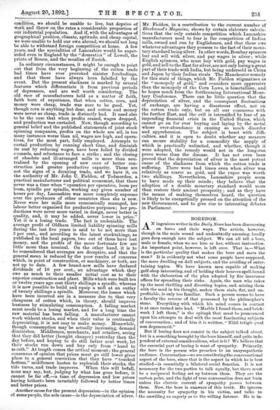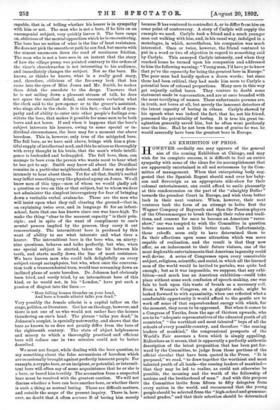BOREDOM.
AN ingenious writer in the Daily News has been discoursing on bores and their ways. The article, however, though in the main sound and undoubtedly amusing, hardly goes deep enough into the subject. We can all tell a bore, male or female, when we see him or her, without instruction.
An important point, however, is left over. That is,—What is the particular quality that makes the bore and mars the man? It is evidently not what some people have supposed, the mere dwelling on dull subjects, and the avoiding of enter- taining topics. We have known men capable of making golf-shop interesting, and of holding their hearers spell-bound with the elaboration of the plan adopted by fire insurance offices for spreading their risks. Again, the man who takes up the most thrilling and diverting topics, and, mixing them with the mud in his thought, makes them stale, flat, and un- profitable, is only too familiar. Such a person seems to have a faculty the reverse of that possessed by the philosopher's stone. Everything with which his mind comes in contact is at once turned into lead. "Marble I found them, and brick- work I left them," is the epitaph that must be pronounced upon his attempts to deal with the most fascinating subjects of conversation ; and of him it is written, " Nihil tetigit quo& non degeneravit."
But if boring does not consist in the subject talked about, but is a something brought by the bore himself, and quite inde- pendent of external considerations, what is it ? We believe that the essential part of boring is want of sympathy. Primarily, the bore is the person who preaches to an unsympathetic audience. Conversation—we are considering the conversational aspect of the bore, since that is the aspect in which be is best studied—is essentially a bilateral social function. It is not necessary for the two parties to talk equally, but there must be a reciprocal feeling set up between them. They are the carbon poles, and the light of true conversation does not burn unless the electric current of sympathy passes between them. Now, the bore is unaware of this truth. He ignores the necessity for sympathy in his victim, and talks to the unwilling as eagerly as to the willing listener. He is in- capable, that is, of telling whether his hearer is in sympathy with him or not. The man who is not a bore, if he hits on an uncongenial subject, very quickly leaves it. The bore rasps on, oblivious of the mental opposition which be is encountering. The bore has no notion of what is the line of least resistance. He does not pick the smoothest path he can find, but snorts with the utmost unconcern down the road of maximum friction. The man who is not a bore sees in an instant that the story of how the village pump was painted contrary to the orders of the vicar's churchwarden is not interesting to his audience, and immediately changes the subject. Not so the bore. He knows, or thinks he knows, what is a really good story, and, therefore, oblivious of the far-away look that has come into the eyes of Miss Jones and Mr. Smith, he makes them drink the anecdote to the dregs. Unaware that. he is not sailing down a pleasant stream of talk, he does not spare the smallest detail, and recounts verbatim what the clerk said to the pew-opener or to the grocer's assistant, who sings alto in the choir. It is this fact,—that lack of sym- pathy and of ability to enter into other people's feelings con- stitute the bore, that makes it possible for some men to be both bores and not bores. If and when it happens that the bore's subject interests his hearers, owing to some special or in- dividual circumstance, the bore may for a moment rise above boredom. This is, however, only true of the mitigated bore. The full bore, as we have said above, brings with him a plen- tiful supply of intellectual mud, and this he mixes so thoroughly with every thought in his brain, that the man's whole intelli- gence is beclouded and bedraggled. The full bore, then, can manage to bore even the person who wants most to hear what he has got to say. Smith may know all about the Druidical remains in a particular neighbourhood, and Jones may desire intensely to hear about them. Yet for all that, Smith's recital may inflict something very like physical agony on Jones. We all know men of this type—men of whom we would gladly ask a question or two on this or that subject, but to whom we dare not administer the simplest interrogatory for fear of bringing down a veritable verbal avalanche. These are the men who will insist upon what they call clearing the ground—that is, on explaining twice over, and in language fit for an infant- school, facts that one has known since one was knee-high. To make the thing "clear to the meanest capacity" is their prin- ciple; and in spite of the want of compliment to one's mental powers implied by the process, they carry it out remorselessly. The intermittent bore is produced by this want of ability to see what interests and what tires a hearer. The intermittent bore is the bore who, on ninety- nine questions, behaves and talks perfectly, but who, when one special subject is started, takes the bit between his teeth, and starts madly down the line of most resistance. We have known men who could talk delightfully on every subject except metaphysics, but who, when once the conversa- tion took a transcendental turn, would tear screaming down an inclined plane of acute boredom. Dr. Johnson had obviously been tried, and sorely tried, by an intermittent bore of this kind, or he would not, in his "London," have put such a passion of disgust into the lines :— "Here falling houses thunder on your head, And here a female atheist talks you dead."
Very possibly the female atheist is a capital talker on the stage, politics, or literature. Get her on theology, however, and there is not one of us who would not rather face the houses thundering on one's head. The phrase "talks you dead," in Johnson's couplet, is specially noteworthy, and shows that the bore as known to us does not greatly differ from the bore of the eighteenth century. The state of abject helplessness and misery to which a thoroughly practised and efficient bore will reduce one in two minutes could not be better described.
We must not forget, while dealing with the bore question, to say something about the false accusations of boredom which are occasionally brought against perfectly innocent people. For example, a crypto-bore, or an incipient, or potential, or intermit- tent bore will often say of some acquaintance that he or she is a bore, or bored him terribly. The accusation from a suspected bore must be received with the greatest caution. We will not discuss whether a bore can bore another bore, or whether there is such a thing as mutual boring. Those are difficult matters, and outside the scope of the present inquiry. There is, how- ever, no doubt that A often accuses B of boring him merely
because B has ventured to contradict A, or to differ from him on some point of controversy. A story of Carlyle will supply the example we need. Carlyle took a friend and a much younger man out walking with him, and, in his usual way, indulged in a monologue, in which, nevertheless, his companion was much interested. Once or twice, however, the friend ventured to put in a word or two of objection in regard to something said by Carlyle. This annoyed Carlyle intensely, and when they reached home he turned upon his companion and addressed to him the following warning: "Young man, I'd have ye to know that ye've the capaacity for being the greatest bore in Europe." The poor man had hardly spoken a dozen words ; but since these had been critical, they had made him seem to Carlyle a potential bore of colossal proportions. Many men in this way get unjustly called bores. They venture to doubt some statement made in conversation, and are at once branded with the most terrifying of names. These unfortunate persons are, in truth, not bores at all, but merely the innocent detectors of the latent capacity of boring in others. Carlyle showed by his speech what was indeed the fact, that he, not his friend, possessed the potentiality of boring. It is true his great im- agination generally saved him, but he often went perilously near the line. Had he not been the man of genius he was, he would assuredly have been the greatest bore in Europe.



































 Previous page
Previous page